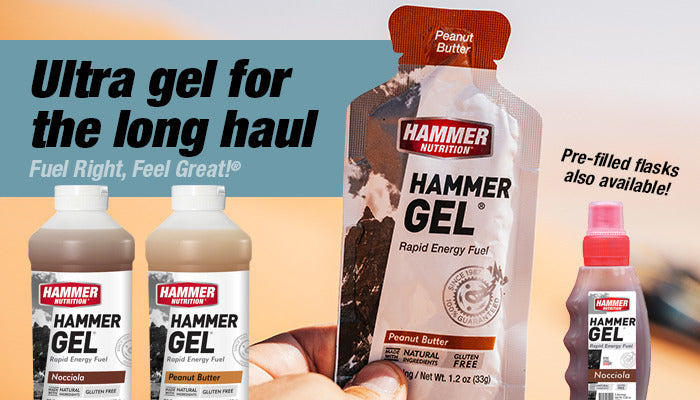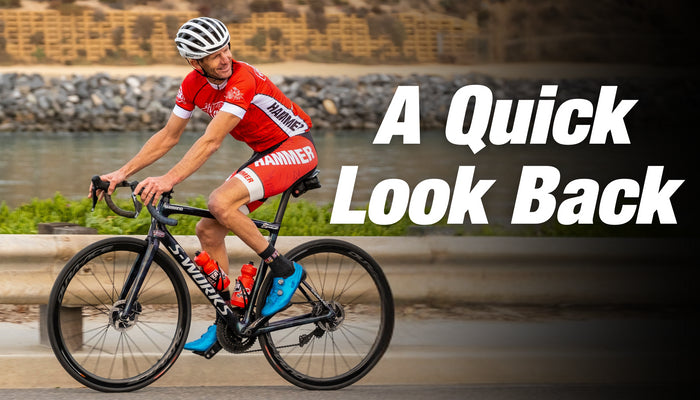
For Better Athletic Performance & Overall Health
BY STEVE BORN
Hammer Nutrition consistently maintains the position that consuming a modest amount of sodium (salt) in your diet and during exercise will promote better performances in your workouts and races, and contribute to a healthier life. However, there are still a large number of experts recommending that you increase your sodium intake - either on a daily basis, in the week leading up to an event, during an event, or all three combined - to prevent heat-related problems. Many other nutritional companies have followed suit, adding more and more sodium to their fuels under the assumption that increased amounts of this mineral is the solution to fulfilling all your electrolyte needs.
We don't deny that sodium is an important mineral for maintaining optimal exercise performance, and we're aware that sodium is excreted faster than any other electrolyte during exercise. However - and this is the key - the body has specific, complex and highly effective mechanisms that regulate sodium excretion. When endogenous (inside the body) levels of sodium get too low, hormones are released to keep existing sodium circulating within the system and not be excreted.
Excess sodium intake - be it via diet and/or consumed during exercise - disrupts and even neutralizes the body's built-in mechanisms that are in place to monitor, recirculate, and conserve the body's sodium stores, which causes more sodium to be excreted. You're actually doing your body a major disservice by oversupplying it with too much salt! On the other hand, a low-sodium diet along with a more conservative sodium intake during exercise - that includes a balanced blend of other electrolytic minerals - creates an environment where lower amounts of sodium are lost in sweat and urine.
Scary Salt Stats
Even more alarming are the numerous negative health effects associated with too-high dietary sodium intake, including high blood pressure, heart attack, and stroke, as well as damage to the kidneys, gastric ulcers, liver disorders, and stomach cancer. There's even a link between excess sodium intake and increased risk of osteoporosis.
The studies showing the harmful effects of high-sodium intake appear to be coming in at a near-daily basis. The results of one of the newest studies to appear, High Dietary Sodium Linked to Subclinical Cardiac Dysfunction [1], suggest a mechanism that may link high sodium intake to cardiovascular/heart issues via aldosterone. Aldosterone is the hormone that monitors serum sodium levels and, when those levels drop during exercise, it is via aldosterone that sodium is recirculated back into the system via the kidneys. When sodium intake is excessive, it causes the body to produce too-high amounts of aldosterone.
Dr. Thomas H. Marwick states, The possible role of aldosterone in the observed sodium-cardiac function link brings the possibility that the observed myocardial change could be related to fibrosis (the thickening and scarring of connective tissue). Dr. Marwick added that this new research supports renewed attention to the potential benefits of controlling salt intake, especially in individuals with a risk of myocardial dysfunction. Because of the pervasive presence of sodium in the Western diet, there is some urgency in clarifying this information.
Perhaps the scariest stat of all? One study shows that an estimated 1.65 million global cardiovascular deaths each year are linked to high sodium consumption. [2]
How much sodium is too much? The American Heart Association recommends no more than 2,300 mg a day, and an ideal limit of no more than 1,500 mg per day, for most adults. Unfortunately, Americans consume amounts that far exceed the AHA's recommendations each day. This is why it's crucial that you be more aware of your salt intake each day, and not just in your food. Salt is the primary ingredient in most electrolyte drinks on the market, oftentimes in amounts that are excessively high, which is cause for concern. You need to replenish electrolytes in a balanced, healthy way, without the overabundance of salt. Hammer Nutrition's sports drink, HEED - as well as our Endurolytes products - offer a complete, balanced array of electrolytic minerals, not just salt. It's the beneficial and healthy way to fulfill your body's electrolyte requirements.
Suggested Dosages
Our general recommendation is 1 capsule of Endurolytes or ½ tablet of Endurolytes Fizz for every 50-60 pounds of body weight hourly, with the understanding that you can, and should, increase the dose on an as-needed basis when the weather gets hotter.
Every scoop of HEED supplies 100 calories and the same amount of electrolytes as found in 1 Endurolytes capsule. For some athletes, 1-2 scoops of HEED mixed in 20-25 ounces of water will satisfy all their calorie, fluid, and electrolytes needs for an hour. Heavier athletes and/or athletes exercising in hot weather may need additional capsules of Endurolytes to satisfy their electrolyte needs more precisely.
When the weather conditions are excessively hot - especially when they're beyond what your body is acclimated to - and/or if you have extremely high sweat rates, 1-2 capsules of Endurolytes Extreme will be your go-to product.
Summary
Our position on sodium intake is summarized by Dr. Bill Misner's words: Evidence supports limiting sodium intake during rest and exercise. The harmful effect of more chronic sodium overdose, above the body's daily need, is a real and present danger that compromises optimal health. [3]
It's important to be aware of how much sodium you're consuming in your daily diet. If it's not a modest amount, then now is the time to lower it. And with Hammer Nutrition's HEED and Endurolytes, you don't have to worry about sodium overload - we give you the balanced blend of electrolytes.
REFERENCES:
[1] Selvaraj S, Djoussé L, Aguilar FG, et al. Association of estimated sodium intake with adverse cardiac structure and function: from the HyperGEN study. J Am Coll Cardiol. 2017;70:715-724.
Mozaffarian, D; Fahimi, S; Singh, G; Micha, R; Khatibzadeh, S; Engell, R; Lim, S; Goodarz, D; Ezzati, M; and Powles, J. Global sodium consumption and death from cardiovascular causes. N Engl J Med 2014. 371:7, 624-634. DOI: 10.1056/NEJMoa1304127
[2] Does a High Sodium Diet Inhibit Endurance Performance and Health? http://www.hammernutrition.com/knowledge/endurance-library/high-sodium-diet-inhibit-endurance-performance-health/









